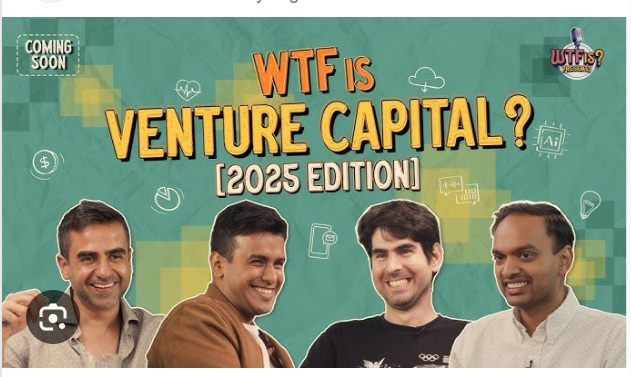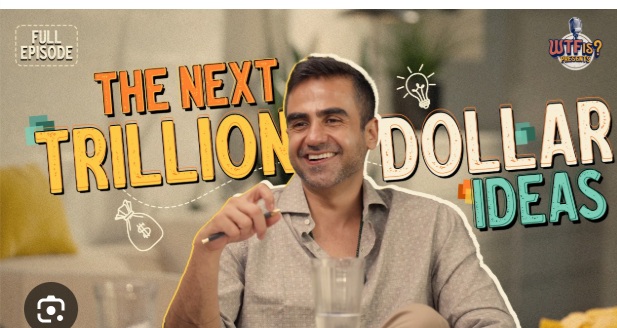Nikhil Kamath Brings VCs to India to Hack the Future of AI, Money & Humanity

FinTech BizNews Service
Mumbai, August 30, 2025: In a much-anticipated return to the classic panel-discussion format, investor and entrepreneur Nikhil Kamath brings together leading venture capitalists: Deedy Das, Principal, Menlo Ventures; Nikunj Kothari, Partner, FPV Ventures, and Niko Bonatsos, Managing Director, General Catalyst for a wide-ranging conversation on the future of technology, investing, and society.

From AI’s hidden shifts to the fate of dating apps, from India’s demographic edge to the rise of longevity, the discussion spanned bold bets and contrarian takes on where capital and humanity are heading. Key discussions include:
1. Which sectors should one avoid?: Kicking off conversations, Nikhil asks the panel to name one sector investors or entrepreneurs should stay away from over the next decade. He asks, “Which industry has the most headwinds?” Nikunj Kothari leaned on his tech bias, “Anything that is not technology-forward I would not put [money] in.” He highlights how AI is transforming even “uninvestable” industries, “Factories are now begging for solutions that never used to happen before. For Niko, the red flag is saturation. He explains, “If it’s something everyone is going after 100 times, it’s probably too late.” He also warned US-based founders against China.

2. What is everyone going after? When Nikhil asks which are some of the hot sectors today that everybody is going after, Deedy highlighted that voice-driven AI applications are oversaturated, explaining, “AI receptionists, multiple applications of voice for the same 10 things are pretty hot.” Niko echoed the sentiment saying, “If you’re trying to do something, you have to break the pattern.” Still, he noted that unconventional founders can be the real outliers, while Nikunj spotlights AI healthcare as a sector with huge potential.
3. AI trends that are changing: Nikhil set the stage with a sharp prompt: “What’s one nuanced AI trend that’s changing, something an outsider like me wouldn’t know?” Deedy pointed to three shifts - the battle for talent, a looming data crunch, and China’s underplayed progress. Niko highlighted AI’s growing role in science, “Many theoretical physicists are using AI to help prove big theories in very novel ways that a human mind would have a much harder time deriving,” while also pointing out that professionals refining AI outputs have “a very big market opportunity.” Nikunj added: “My hot take would be AGI is already here…in a capabilities perspective, it’s already better.”

4. Robots and the Case for India: India’s robotics journey is uniquely shaped by its abundant, cheap labor, sparking the question: “Do you think there is a use case in India for that?” as Nikhil asks. Nikunj draws striking BPO parallels: “The new BPOs are these labelers who will be getting data that these companies need to make the models better. It is the next natural transition.”
5. Demographics, Technology & the Future of Humanity: When Nikhil pressed on how demographic decline links to AI, Deedy explained: “A lot of economic growth is subtly tied in with the growth of the population, the growth of consumption overall. AI is no good unless you have somebody using something at the other end.” Nikunj warned that AI could even deepen isolation: “We are confiding more in ChatGPT than we talk to our closest humans, including our partners.”

The conversation then turned to young people and fertility. According to Niko, “Young people now have less sex because they’re addicted to their phone. They don’t even know how to interact with another human, especially in the post-COVID world.” He highlighted the severity of the crisis, warning that some countries could see their populations fall to one-tenth in just two generations. Nikhil suggested government incentives, but Deedy countered: “I don’t know any government has successfully been able to do that... I think we need to make having kids cool again.” This leads to Nikhil asking a larger question: why have children at all in an AI-powered future? Niko responds explaining, “Sometimes it’s vanity, sometimes it’s love, sometimes it’s just meaning.”
6. Urbanisation: Nikhil questioned whether people will continue flocking to dense cities or disperse as digital life grows. Niko was emphatic: “We are social animals. Urbanization is inevitable, it’s great for the planet and productivity.” Yet Nikunj warned of rising inequality: “As digital life expands, real estate becomes the real blockchain, a supply-constrained asset everyone clings to.”
7. Longevity and wellness: Shifting gears, Nikhil asked: is longevity and wellness the business of the future? Niko doesn’t hesitate saying, “Great place to be.” He explained that longevity, biotech, and wellness aren’t just lifestyle trends, but trillion-dollar industries in the making. Deedy highlighted biotech’s rapid progress in drug discovery: “How do we solve a bunch of the diseases that cause early death? There’s a lot of work going on there.” Still, he cautioned, longevity is a slower burn: optimism is high, but the payoff will take time.
8. Is Religion Making a Comeback?: Nikhil posed the big question: “Would you bet on religion making a comeback?” Niko responds by highlighting “I think it is making a comeback.” He reflects on how declining Catholic influence in Latin America coincided with steep fertility drops, arguing that narratives, not incentives drive these shifts. Pushing the idea further, Niko added, “There might be an AI religion that gets formed, who knows? It could fulfill the emotional needs some humans might have.”
9. The Future of Dating Apps: From Swipes to Experiences: Nikhil notes, “30% of people who swipe have never even been on a date.” Niko asserts that the future is curated, with AI handling introductions and small talk before the actual date. He adds that dating apps’ skewed algorithms mean "8-10% of men get 80% of the dates. That’s terrible for humanity.” Deedy notes that offline dating is becoming a premium. Niko agrees, highlighting a startup that organizes group outings and argues, “The swiping paradigm has run its course.”
10. Viewpoint #1: Premium, Outcome-Focused Education Will Surge in India: Nikhil set the context: “Indian families with rising income, reducing family size, will invest in premium education. Outcome-focused education will take preference. What do you guys think?” Niko agreed but noted the cultural contrast: “In India, South Korea, or Greece, education is seen as the path to upward mobility. Once societies reach the top, priorities shift to arts, culture, or sports.” underscoring that as incomes rise and family sizes shrink, Indian households are set to double down on premium, outcome-driven education, making it one of the fastest-growing sectors over the next decade.
11. Viewpoint #2: Secondary Markets for Private Companies Will Explode: Nikhil floated the idea: “Secondary markets for private companies will become a big thing.” Niko explained the shift in market dynamics: “We’re living in a time where a lot of the value is captured by private investors. The sad part is retail investors and pension funds miss out on this wealth until much later.” Nikunj emphasized the inequality explaining, “Access is the core issue. If you think about future imbalances, this is where they deepen. Only a few gatekeepers have access. Maybe by the next decade we’ll see change.”
12. Viewpoint #3: The World Will Be Older and Sicker / The Future of Senior Living: Nikhil initially posits that the world will be “older and sicker,” which creates profitable opportunities in wellness and hospitalization. He shares, “When my dad was sick, I got him a nurse. Then he didn't have to do anything. He didn't have to move, Somebody was doing everything for him. That's the worst thing you can do for your parents.“ While a cultural stigma exists, Niko bets highly on senior living explaining, “Unless there are infectious diseases like COVID, senior living facilities are going to do really well.”
13. Viewpoint #4: Content as the Biggest Differentiator in Building a Business: Moving onto the future of content, Nikhil argues, “To be able to build a brand you have to be able to hold attention… content is going to be the biggest differentiator.” Niko agrees, stating that if you know how to “speak whatever the medium where content gets viewed is fluently, you can do really well.” Nikunj offers a counterpoint, “The product has to be phenomenal… otherwise it’s just slop.” He highlights that retention comes only from a great product, not just attention. He and Nikhil ultimately agree that it's a two-part equation: “Content helps you get discovered, but retention comes only from a great product.”
14. Viewpoint #5: Adoption of Electric Vehicles and Hydrogen vs IC: Nikhil asks if by 2035 most vehicles would be EVs or hydrogen-based and notes that in India, EV scooters save significantly on running costs, yet adoption remains low, possibly due to Chinese dominance and protectionism. Niko agreed: “If the cheapest car was an EV, everyone would buy an EV.” Deedy remains bullish on Tesla driving cost efficiencies, predicting a majority of cars could be EVs in 10 years. Nikunj, warns adoption is slower than expected, shaped by US politics, battery limitations, and consumer habits.
15. Viewpoint #6: Beauty as a Category: On the topic of beauty and luxury, Deedy notes, “Beauty and content are in line with each other.” Niko connected the dots to wealth creation, “Look who are the wealthiest people outside of tech, anyone who is in beauty and luxury.” Nikunj suggested going premium, “I would build a very high-end, luxurious brand for the top 10% of Indian males.” Nikhil pushed the group to imagine what might work if they were to build a brand today. The group agrees, anything that makes anti-aging solutions easier, cheaper, and content-driven, especially if tailored for men, could be a breakthrough.
16. Viewpoint #7: Live Events – Concerts, Theatres, Restaurants as Experiences: Nikhil asks about the future of live events as experiences, broadening its scope to concerts, theatres, plays and even high-end restaurants. Deedy shares, “I think the nature of live events is shifting. In his view, much of the demand was status-driven rather than about the event itself. Niko agrees that perception plays a big role but pointed out the economic potential: “In a world where we get tired of being online in front of our screens for 14 hours, there is going to be a premium.” He cited Taylor Swift as proof of how superstars could monetize scarcity and community at scale. Nikunj emphasized scarcity as the true driver, explaining, “Scarcity will never go away. Desirability comes from scarcity.” He cautions on growth, highlighting that digital would continue to dominate attention capture.
17. Viewpoint #8: Climate Tech: On the topic of climate tech, Deedy shares viewpoint, “Climate tech is an overloaded term. If we can figure out how to get energy in a hyper-dense way, then we won’t need to solve all these other problems.” On investment, Deedy warns that failure rates are high. Nikunj, adopting a cautious approach says, “The world will get much worse in the next ten years from a climate change perspective.”
18. Viewpoint #9: Data Centers as an Investment: Nikhil observes, “In India, data centers have become like a real estate play almost.” He asks if data center businesses are a good place to get allocation. Niko pressed on fundamentals inquiring about real estate and energy arbitrage. Nikhil explained that different players lean on different narratives, from proximity to power stations to leveraging real estate holdings. He highlighted India’s data localization mandate, requiring financial data of Indians to stay in-country, as a major driver of domestic demand. Niko agrees, “If you can bet on the operator that over time will be the consolidator, I think it could be a good trade.” Nikunj argued data centers remain underrated: “Even with efficiency, we are going to use far more compute. It is like a nuclear weapon, you will want to keep ownership of this. Right now it is a big geopolitical risk.”
19. Viewpoint #10: Young Entrepreneurs in India: Nikhil shifted the focus to home: “What is India’s play? I’m talking to young entrepreneurs in India. Where is India fitting?” Niko began with perspective: “Knowing where trends are heading is important.”
Deedy was more blunt, “Unlike past technologies where you could build local equivalents, like Ola for Uber or Oyo for Airbnb, in AI there’s no real local advantage. Everyone’s competing on the same global playing field. India hasn’t built the foundation - core research, GPU expertise, capital depth. Most of the best AI talent has already left. If India wants to compete, it has to invest in research and retain talent long before the wave crests. China did that, India didn’t.”
Nikunj emphasized demographics: “India has a two-decade advantage with the youngest workforce in the world. If we don’t capture it, that edge shifts to Africa. India doesn’t need to win at AI research. It should focus on sectors where it has structural strengths, manufacturing, biotech, healthcare, and climb up the value chain.” Niko closed optimistically, “Now is probably the best time ever to be a young founder in India. Knowledge and global exposure are democratized. The local market is massive. Role models exist both in India and abroad. I’d be excited to build there.”
20. Viewpoint #11: Can Patriotism Be Sold?: Nikhil pushed the panel with a provocative question: “Can patriotism be sold?” Nikhil argued that India’s cultural conditioning discourages risk-taking and questioning norms, which stifles innovation. He shares his own entrepreneurial path was born of pragmatism, not disruption: “There was no rebellion really. We did everything which is quite cliché. Have we contested the norm or changed the status quo in the society that we have our peer groups in? No.” When asked if he now had the ambition to break norms, Nikhil was candid: “I have ambition, yes. But I don't know if I'm capable enough of doing it because I don't have unfair advantage. I don't know what my unfair advantage is in this world. I'm trying to still figure that out. Right now is a very learning phase for me where I'm trying to figure out what I don't know before I start to figure out what I want to do.”
That led back to his central provocation: “There are brilliant Indian minds in the US. For them, coming back to India and starting something, adding patriotism to that projection could make a lot of sense. The question is, how do you make being patriotic cool, like it was after the Second World War?” Nikhil floated ideas like priority access, government privileges, even a new “NRI city” with world-class living standards. But Deedy cut in with a reminder: “Getting people back is one thing. Retaining them is much harder.”
Access the whole podcast here: Inside Silicon Valley’s VC Playbook | WTF is Venture Capital? - 2025 Edition | Ep. 24